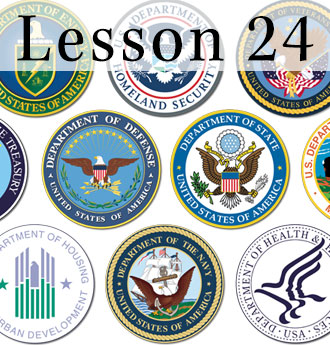The Resource Center » Level 3 » Unit 4 »
Lesson 24: How Are National Laws Administered in the American Constitutional System?

Lesson Purpose
Departments, agencies, and bureaus that administer the laws, often referred to as the bureaucracy, touch every aspect of American life. For example, the Environmental Protection Agency sets standards for water and air quality. The Department of Transportation adopts rules for the development and operation of the interstate highway system. The Federal Aviation Administration oversees air traffic safety. The Food and Drug Administration approves medications. This lesson examines the role of administrative departments and agencies in America's national government.
When you have finished this lesson, you should be able to explain why Congress creates administrative units, the circumstances that contribute to their creation, and the range of governmental functions that administrative units perform. You also should be able to identify some of the checks on the exercise of administrative power. Finally, you should be able to evaluate, take, and defend positions on public administration in the United States.
When you have finished this lesson, you should be able to explain why Congress creates administrative units, the circumstances that contribute to their creation, and the range of governmental functions that administrative units perform. You also should be able to identify some of the checks on the exercise of administrative power. Finally, you should be able to evaluate, take, and defend positions on public administration in the United States.
Lesson Objectives
When you have finished this lesson, you should be able to
- explain why Congress creates administrative units, the circumstances that contribute to their creation, and the range of governmental functions that administrative units perform,
- identify some of the checks on the exercise of administrative power, and
- evaluate, take, and defend positions on public administration in the United States.
Lesson Terms
bureaucracy
Governmental departments and agencies and their staffs, principally civil service members and political appointees.
bureaucracy
civil service
independent agencies
patronage
quasi–judicial powers
quasi–legislative powers
Lesson Biographies
Madison, James (1751-1836 CE)
The "Father of the Constitution" was born to a wealthy Virginia family. He was taught at home and in private schools, then graduated from the College of New Jersey. While deciding whether to become a lawyer or minister, Madison became involved in the revolutionary cause, thereby entering state and local politics. His poor health kept him from serving in the military. In 1780, Madison was chosen to serve in the Continental Congress, where he played a major role. He was one of the most influential voices calling for a constitutional convention. He came to the Philadelphia Convention with a plan for the new government, took extensive notes on the proceedings, spoke more than 150 times, and worked tirelessly on various committees. As one of the authors of The Federalist, Madison was also a key figure in the battle for ratification. Following the convention, Madison served as a member of the U.S. House of Representatives, helping to frame the Bill of Rights and organize the executive department. Under Jefferson, Madison served as secretary of state. He then succeeded Jefferson as president. In retirement, Madison continued to speak out on public issues.
Roosevelt, Franklin D. (1882-1945 CE)
Lesson Primary Sources
Federal Register
The Federal Register is the official journal of the U.S. federal government, and contains unclassified public notices from federal agencies. It publishes all unclassified changes to rules and regulations, as well as notices of meetings.
Federalist No. 68
Federalist No. 47
United States Constitution






